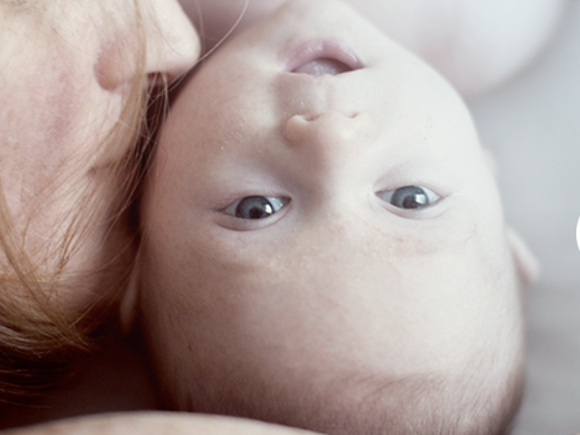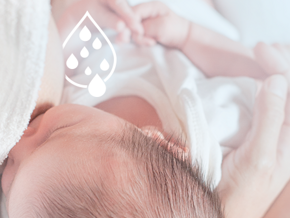
Watch this video to learn the benefits of breastfeeding for both mum and baby.
Breastmilk changes
Colostrum, also referred to as first milk, has more benefits than most people realise. Your very first drops of colostrum are providing a boost to building a strong immune system for your baby. Each feeding over the next 3 to 5 days will be rich in proteins, vitamins, fatty acids and bioactive substances, especially suited for a newborn. Colostrum is a yellowish or creamy colour and thicker than the “next milk”.
Colostrum turns into transitional milk, which lasts about 2 weeks. It has more energy, fat, and vitamins to keep up with your baby’s evolving nutritional needs.
“Mature milk” is the final, ongoing milk that you will provide to your baby. It has higher water content for hydration, but with the right balance of protein, fats and carbohydrates needed for his growth. Breastmilk differs in the amount produced in each breast and the nutrient content adapts to what your baby needs.
Some points on protein
Protein is especially important for your baby. He needs the amino acids, the smaller parts of protein, for growth, development, and health. In fact, protein is the most abundant component of his developing body. Protein is needed to help build his growing muscles and bones, as well as repairing his body tissues.
Healthcare professionals agree that protein is critically important for your baby’s long-term healthy, growth and development. Fortunately, breastmilk is designed to provide the optimal protein mix for your little one.
Positioning pointers
Planning ahead with a few comfortable positions will make breastfeeding more enjoyable for the both of you.
- Being left or right handed may influence the feeding positions you choose when holding your baby to breastfeed. This may mean you use different holding positions depending on which arm you use to support your baby. Holding with one arm may get tiring, so have a favourite and second position in mind to easily switch, if needed.
- Comfortably seat yourself or lay down before getting your baby in position. This will allow him to start feeding right away without any awkward repositioning.
- Your baby’s head should not be tucked down or too far back; these head positions make swallowing more difficult.
- Position your baby for feeding when you see the first signs of hunger. If he’s ready to feed he is alert, calm and smacking his lips. Don’t wait for him to fuss and cry.
- Breastmilk has three distinct stages, each providing the nutrition your baby needs when he needs it.
Burping your breastfed baby
Though your breasts don’t have air in them, your baby may swallow air in the process of latching-on and off the breasts, or if he’s crying.
- Let your baby feed until he releases the breast then use that opportunity to see if he’s ready to burp.
- It’s important to give your baby the opportunity to burp, but don’t be alarmed if he doesn’t. Breast fed babies swallow less air and so usually have less need to burp.
Counting the dirty diapers
Breastmilk has natural properties that help produce regular stools and clear out the meconium, a newborn’s earliest stool resulting from what he ingested during pregnancy.
- The first 48 hours will produce tarry black stools. One stool within the first 24hours then two stools the next day is typical.
- By the third day, expect to change three stooled diapers or more each day.
- Three or more yellow seedy stools, each day, during the first four to six weeks is one good sign of a well fed breastfed baby.
Skin-to-skin breastfeeding
Skin to skin, also referred to as “kangaroo care”, is well recognized as beneficial for Mum and baby. Just look at the upside of skin-to-skin feeding.
- Supports stabilising your baby’s heart rate and body temperature.
- Improves baby’s breathing pattern.
- Improves his deep sleep time so he’s better rested and prepared for feedings.
- Decreases your stress response and has a calming effect on you both.
- Increases your milk supply.
Signs of a healthy breastfed baby
Not being able to measure how much your baby is eating may make you feel a little anxious. But here are some simple ways to know that you’re supporting his every nutritional need.
- Feedings are comfortable for both of you.
- Your baby feeds eagerly but calmly.
- After feeding, your baby has more relaxed arms and hands.
- Three or more dirty diapers each day for the first four to six weeks.
- Your breasts will feel softened and less full after feedings.
Keeping up your energy
Breastfeeding requires more energy from you. You’ll need about 2000 extra kilojoules and additional fluid intake each day to keep up with the demands of producing milk. Choose the kilojoules wisely by adding nutrient dense foods to your diet. Quick healthy snacks might include:
- Whole grain crackers with low fat cheese and sliced tomatoes or fresh fruit.
- Yoghurt or a fruit smoothie.
- A hardboiled egg or half of a tuna salad sandwich.
- A mix of almonds or walnuts and dried cherries or cranberries.




















